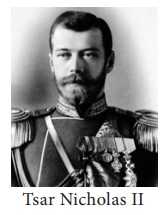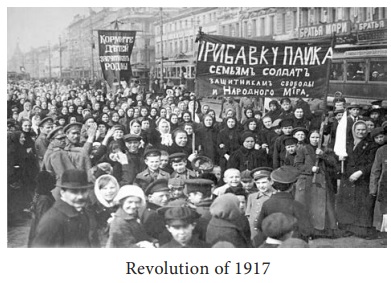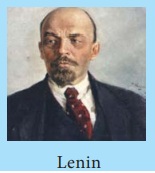Causes of the Revolution - Russian Revolution and its Impact | 10th Social Science : History : Chapter 1 : Outbreak of World War I and Its Aftermath
Chapter: 10th Social Science : History : Chapter 1 : Outbreak of World War I and Its Aftermath
Russian Revolution and its Impact
Russian Revolution and its Impact
Introduction
The
biggest outcome of the War, the Russian revolution, was unique in world
history. The socio-political and economic conditions prevailing in Russia were
brought to a head by the vast losses and sufferings caused by the War. There
were really two revolutions in the year 1917, one in March and the other in
November. On the abdication of the Tsar the bourgeois government which
followed, wanted to continue the war. But the people were against it. So there
was a second great uprising under the guidance their leader Lenin, who seized
power and established a communist government in Russia.
Causes of the Revolution
Social Causes
In Russia
Peter the Great and Catherine attempted westernisation without changing the
social conditions. The Russian peasants were serfs tied to lands owned by
wealthy Russians. After Russia’s defeat in the Crimean War, some reforms were introduced.
In 1861 Tsar Alexander II abolished serfdom and emancipated the serfs. But they
were not given enough land to subsist. These peasants became the powder keg for
the revolution. The labourers and workers whose number had increased on account
of industrialisation were aggrieved as they got very low wages.
Role of Revolutionaries
The
spread of revolutionary ideas among the intelligentsia and their repression by
the Tsar’s government made the socialistically inclined students to carry their
propaganda to the peasantry. Soon, based on the Marxist philosophy, new ideas
began to take shape and a Social and Democratic Labour Party was formed.
Autocracy of the Tsar
Tsar
Nicholas II of Romanov dynasty had little experience of government. His wife
Tsarina Alexandra was a dominant personality and Nicholas was under her strong
influence. Determined that Russia should not be left out in the scramble for
colonial possessions, Nicholas encouraged Russian expansion in Manchuria. This
provoked a war with Japan in 1904. The resulting Russian defeat led to strikes
and riots. On 22 January 1905 Father Gapon, a priest, organised a march of men,
women and children on the Tsar’s Winter Palace in St. Petersburg demanding a
representative national assembly and agrarian and industrial reforms. But
police and soldiers fired on the procession. Hundreds were killed and many
thousands wounded. The events of this day (known as Bloody Sunday) led to
riots, strikes and violence. Nicholas was forced to grant a constitution and
establish a parliament, the Duma. This was no longer satisfactory to the
left-wing parties that formed a Soviet (council) of worker's delegates in St
Petersburg, led by Trotsky.

Opposition to Tsar and Dissolution of Duma
The
outbreak of the First World War had temporarily strengthened the monarchy, as
Russia allied to France and Britain. As there was rumour of a palace
revolution. Nicholas made himself the Commander-in-Chief of the army. At the
end of 1916, Rasputin, who had a domineering influence over the Tsar and the
Tsarina, was murdered by a member of the Tsar’s family. The members of the St.
Petersburg Soviet were arrested. Whenever the Duma opposed the Tsar’s move, it
was dissolved and fresh elections held. Without change of government policy,
the fourth Duma ended with the revolution of 1917.
Popular Uprisings
The bread
shortages among women textile workers, many with husbands in the army, forced
them to go on strike anyway and march through the factory areas of Petrograd,
the capital of the Russian Empire. Masses of women workers demanding “Bread for
workers” waved their arms towards factory workers and shouted “Come out!” “Stop
work!” The city’s 400,000 workers joined the movement the next day (24
February).

Abdication of Tsar
The
government used the troops to break the strike. But soon mutinies broke out in
the barracks. The Tsar ordered a declaration of martial law. But his order was
not broadcast in the city, as there was no one to do this job. The Tsar then
tried to return to Petrograd. The railway workers stopped his train. The
generals at the front and some leaders in Petrograd, frightened by these
developments pleaded with the Tsar to abdicate. On 15 March, Nicholas II
abdicated.
The revolutionary Tamil poet Bharathiyar cheerfully welcomed the
revolution in Russia by penning these poetic lines…..
The Mother Great, the Power supreme,
Turned her glance benign towards Russia,
The Revolution of the Age,
Behold the wonder, rises high
The tyrant howling falls down limp,
The shoulders of the heavenly gods,
Are swelling now with joy and pride,
Eyes hot with unshed tears, the demons,
Perish. O people of the world,
Behold this mighty change!
Provisional Government
There
were two parallel bodies to take on government functions. One was of the
bourgeois politicians of the old state Duma, comprising propertied classes. On
the other there were workers’ delegates drawn together in a workers’ council,
or Soviet. Those in the Duma were able to form a provincial government with the
consent of the Soviets. The Soviet was dominated by Mensheviks and the minority
Bolsheviks were timid and undecided. The situation changed with the arrival of
Lenin.
Failure of Provisional Government
Lenin was
in Switzerland when the revolution broke out. Lenin wanted continued
revolution. His slogan of ‘All power to the Soviets’ soon won over the workers’
leaders. Devastated by war time shortages, the people were attracted by the
slogan of ‘Bread, Peace and Land.’ But the Provisional government made two
grave mistakes. First, it postponed a decision on the demand for the
redistribution of land and the other was government decided to continue with
the war. Frustrated peasant soldiers deserted their posts and joined those who
had resorted to land grabbing. This intensified the rising in Petrograd led by
Bolsheviks. The government banned Pravda
and arrested all Bolsheviks. Trotsky was also arrested.
Takeover by the Bolshevik Party under Lenin’s leadership
In
October Lenin persuaded the Bolshevik Central Committee to decide on immediate
revolution. Trotsky prepared a detailed plan. On 7 November the key government
buildings, including the Winter Palace, the Prime Minister’s headquarters, were
seized by armed factory workers and revolutionary troops. On 8 November 1917 a
new Communist government was in office in Russia. Its head this time was Lenin.
The Bolshevik Party was renamed the Russian Communist Party.
Lenin was born in 1870 near the Middle Volga to educated parents.
Influenced by the ideas of Karl Marx, Lenin believed that the way for freedom was
through mass action. Lenin gained the support of a small majority
(bolshinstvo), known as Bolsheviks, which became the Bolshevik Party. His
opponents, in minority (menshinstvo), were called Mensheviks.

Outcome of the Revolution
The
Russian Communist Party eliminated illiteracy and poverty in Russia within a
record time. Russian industry and agriculture developed remarkably. Women were
given equal rights, including rights to vote. Industries and banks were
nationalised. Land was announced as social property. Land was distributed to
poor peasants. Lenin thought the most important factor for the fall of
Provisional government was its failure to withdraw from World War. So Lenin
immediately appealed for peace. Unmindful of the harsh terms dictated by the
Central Powers, Lenin opted for withdrawing from the War to concentrate on the
formation of new government. In March 1918 the Treaty of Brest– Litovsk was
signed.
Global Influence of the Russian Revolution
The
revolution fired people’s imagination across the world. In many countries,
communist parties were formed. The Russian communist government encouraged the
colonies to fight for their freedom. Debates over key issues, land reforms,
social welfare, workers’ rights, and gender equality started taking place in a
global context.
Pravda is a Russian word meaning “Truth”. It was the official newspaper of the Communist Party of the Soviet
Union from 1918 to 1991.
Related Topics